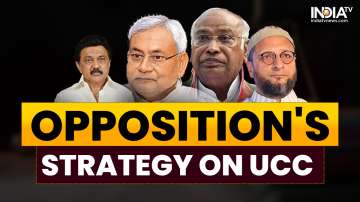UCC row: Prime Minister Narendra Modi gave a strong push to the controversial Uniform Civil Code (UCC) during a BJP public event in Bhopal on Tuesday. His advocacy triggered massive political reactions as Congress and other Opposition parties like- DMK, AIMIM and JD-U opposed the law.
Addressing his party cadres, PM Modi asserted 'two laws in a house is not acceptable'. To support the UCC, the PM linked the law to the rights of Muslim women, saying those who are not in favour of UCC are against the rights of women. In a quick reaction to PM Modi's remark, the Opposition parties attacked him saying he was making such remarks only to divert attention from the real issues like unemployment and Manipur violence.
However, all Opposition parties are not on the same page on UCC. Parties like- Shiv Sena (UBT) and the Aam Aadmi Party (AAP) have in the past spoken in its favour.
Meanwhile, UCC has been the part of BJP's manifesto. It would not be a better time than now just ahead of states elections and Lok Sabha polls for the saffron party.
Why Opposition not in favour?
Congress and other Opposition parties would not like BJP would take credit for UCC implementation in upcoming elections. Congress, the biggest Opposition party, led the attack on the Modi government over UCC. The grand old party slammed the 22nd Law Commission (for its recommendation to implement UCC), reminding it of the 21st Law Commission's statement- "It is “neither necessary nor desirable at this stage” to have a UCC”.
AIMIM leader Asaduddin Owaisi asked whether the country's pluralism would be "snatched away" in the name of the UCC.
Regional parties also Oppose UCC
Bihar Minister and senior JD(U) leader Vijay Kumar Chaudhary alleged that by touching upon the UCC, PM Modi was aiming at communal polarisation. RJD leader Manoj Jha said the Hindu religion also has a lot of diversity and it cannot be painted with one brush.
Northeast states
Politicians in the northeastern states often express views that the UCC or alike uniform law will pose a threat to their highly diverse societies. Articles 371(A) and 371(G) of the Constitution, tribes from the Northeast states are guaranteed special provisions that restrict the parliament from enacting any law which supersedes their family laws.
Threat to Adivasis rights?
Adivasi activists and politicians often protest UCC claiming any effort to impose the law would adversely affect the distinct customs, culture and heritage of SC/ST communities.
Against Muslims?
All Muslims in India are governed by the Muslim Personal Law (Shariat) Application Act, 1937. All India Muslim Personal Law Board opposed the UCC, claiming it will snatch away Muslim's rights enshrined in the 'Muslim Personal Laws'.
Also read- 'How country will progress with two laws': PM Modi invokes UCC in poll-bound MP
Latest India News
